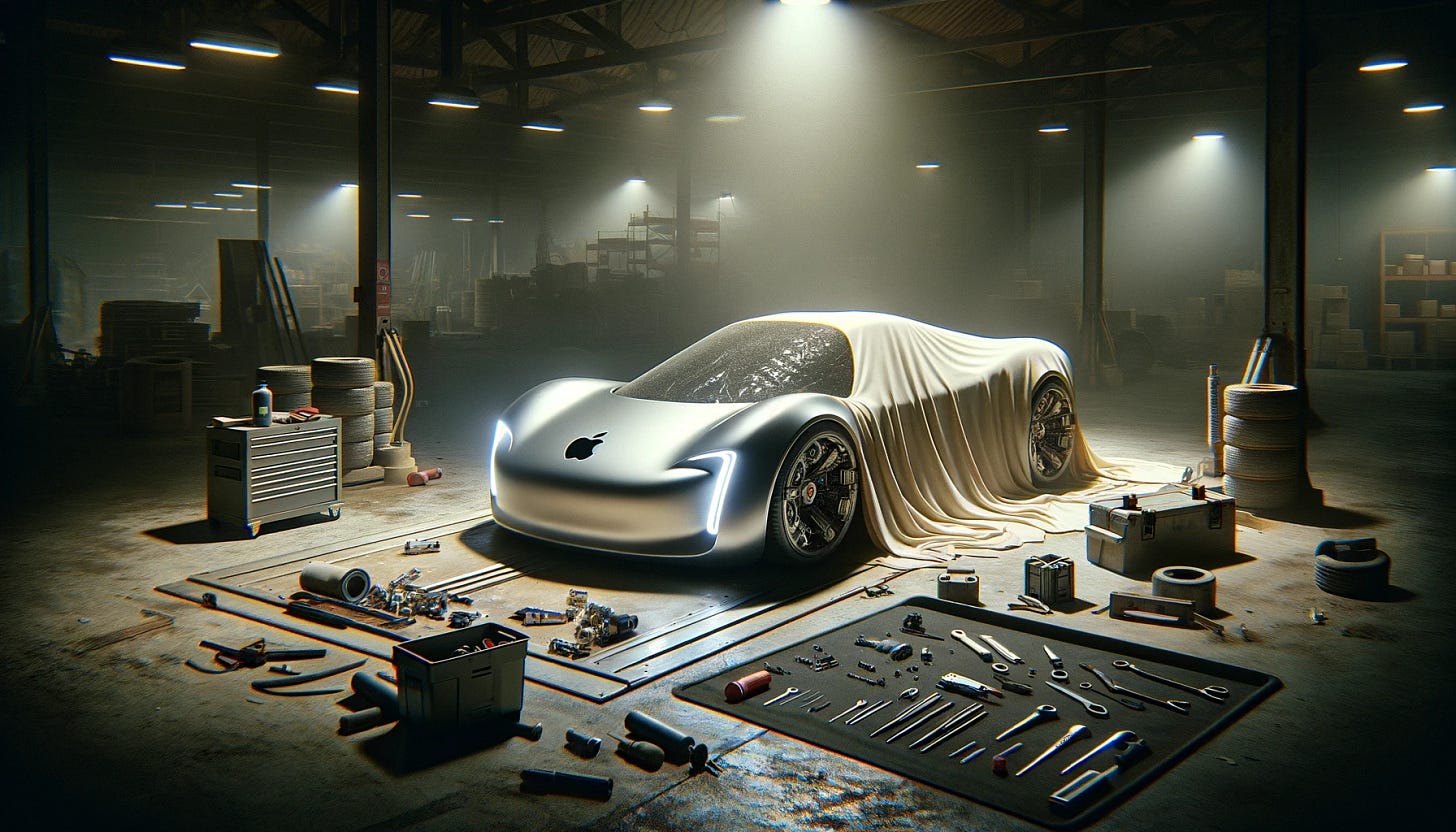Project Titan finally axed: there will be no Apple Car
Unpacking the Implications of Apple's Withdrawal from the Electric Vehicle Race and the Pivot to Generative AI
In a surprising move for many, Apple has officially pulled the plug on its much-anticipated car project, a venture that has been fraught with challenges for over a decade.

I’ve been working professionally in the Apple ecosystem for 10 years, and become a bit of a fanboy along the way. So, here are some initial thoughts on what this signifies for Apple and the tech industry.
1. The post-smartphone questions remain
Apple's decision to abandon its car project underscores a critical insight: cars may not be the next smartphones. Well, that’s perhaps obvious from a consumer perspective, because you can’t take your car into meeting rooms or toilets for one.
But more seriously, Apple needs new products every 5 years or so to keep its hold on the cutting edge of consumer technology. Now, the already risky Vision Pro bet into AR/VR becomes absolutely critical, amid reports many have chosen to return the $3,500 device due to discomfort. What else is there? What’s next?
2. The economics of EVs baffles even Apple
Apple's retreat from the automotive sector also casts a spotlight on the economic viability of producing luxury electric vehicles at scale. If a company with Apple's resources and expertise has concluded that it cannot generate sustainable profits from a $100,000 car, it begs the question: can any company? This situation challenges the industry to rethink the economics of electric vehicles and the strategies needed to make them profitable.
3. This failure highlights Tesla's uniqueness
The contrast between Apple's withdrawal and Tesla's success in the electric car market is stark. Tesla's ability to thrive where Apple hesitated raises critical questions about the unique factors contributing to Tesla's success.
What does Tesla possess that even Apple, with its vast cash reserves, cannot replicate? Is it the gigafactories, Elon Musk's visionary leadership, or the sheer scope and scale of the investment and risk required? Here’s what Elon had to say.
Apple is famous for entering the market at the right time, in a category they didn’t create. Think music players, smartphones, smartwatches, and now virtual reality. They always follow the same formula. Except this time, maybe the numbers just didn’t add up.
4. The infamous non-meeting of Elon and Tim
Apple's history of shying away from large acquisitions comes into focus with the revelation that the company once had the opportunity to purchase Tesla for a mere $20 per share. Now famously, Tim Cook didn’t even take the call.
This missed opportunity is a reminder of the high-stakes decisions that define the tech industry's competitive landscape. It also highlights the cautious approach Apple takes towards acquisitions, often preferring acquisitions of promising frontier technologies and internal innovation over big deals with proven businesses. During the timeline of Project Titan, they did acquire Drive.ai, but I guess that wasn’t enough.
5. The Burden of Sunk Costs
The Apple car project, known internally as Project Titan, represents one of the most high-profile examples of a "sunk cost" in the tech industry. With a decade of investment in terms of time, billions in resources, and talent of 2,000+ people involved, the project's cancellation without yielding any tangible product is a significant piece of tech history.
Apple’s overall success in the years ahead will show whether this was a shrewd calculated reset or an early sign of another failing giant.
6. Pivot to Generative AI
The redirection of the Project Titan team towards generative AI initiatives signals a strategic pivot for Apple. This move indicates a growing recognition within Apple of the urgent need to focus on AI, an area that which they are at least 12 months or more behind all their main competitors. I mean, people were laughing at Google a few months ago, and since then they’ve launched Gemini which is on par with OpenAI’s best models, are launching new AI-powered phones, integrated AI across their cloud services, and publishing cutting-edge research like there’s no tomorrow.
Meanwhile, Apple has been pretty silent, comparatively. They have published and launched a few low-key GenAI things, but all are very incremental so far. From the outside, they are behind on all imaginable AI metrics. If they do nothing big in this space in 2024, that will be bigger news than Project Titan.
They still have the same distribution and hardware advantages as Google, compared to rivals Microsoft and Meta, but they lack a serious AI lab in DeepMind, which now in retrospect seems an absolute steal for Google in 2014 at $400M. All their main rivals either have a top AI lab in-house (Google, Meta) or paid billions to invest in partnering with one (Microsoft, Amazon).
Conclusion
While this news alone isn’t in any shape terminal or even fiscally damaging to Apple, it shows us just how difficult the battle of the tech giants is. Apple now failed to dethrone Tesla and is last to the GenAI party. All can be vindicated, if the Vision Pro is an instant financial success, and they come out swinging in 2024 with something big in AI. If not, are we looking at the next Nokia?


